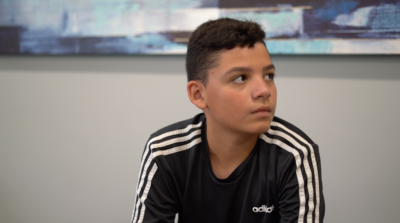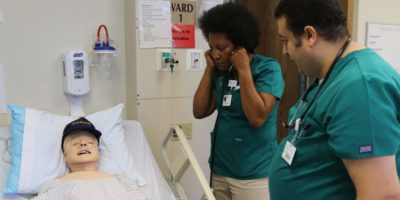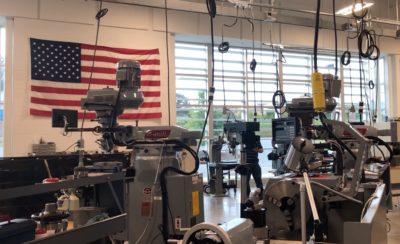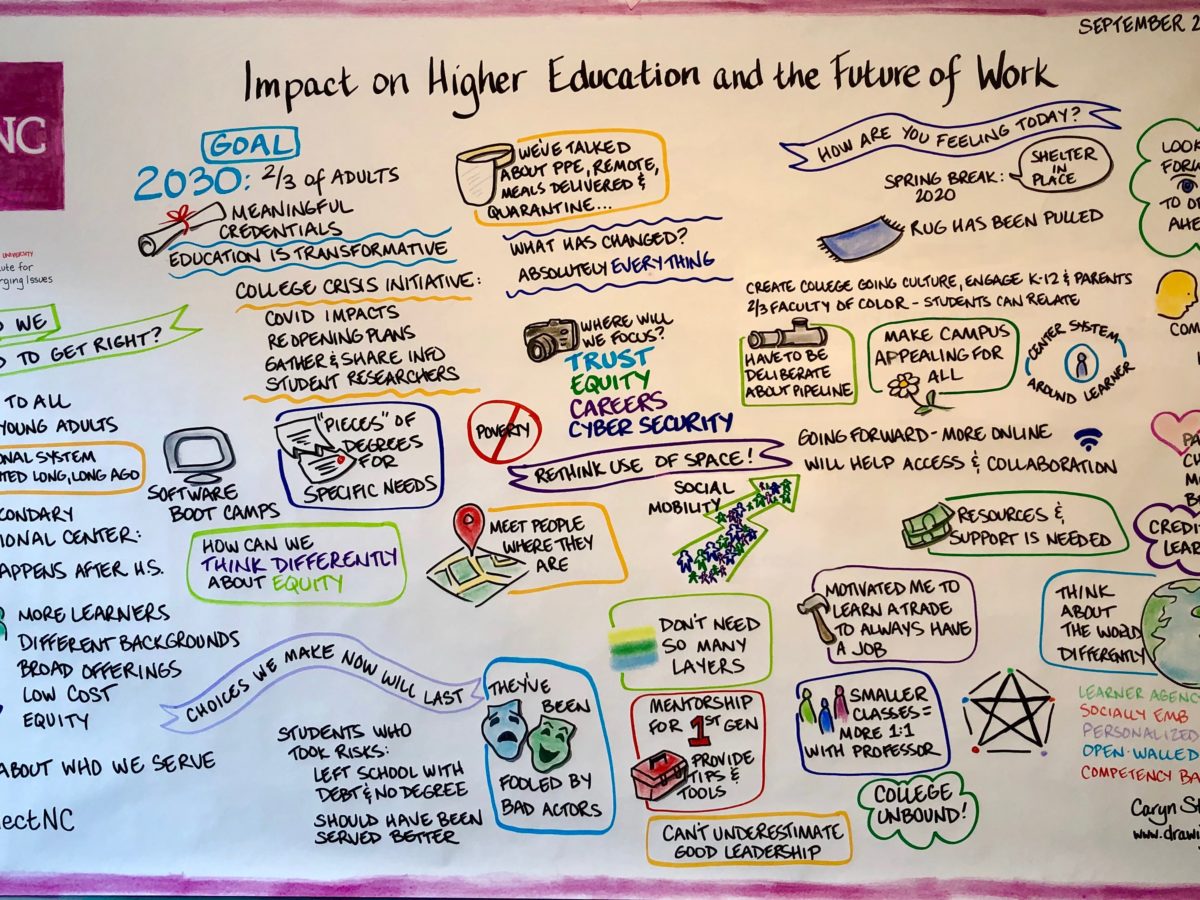
On Sept. 24, the Institute for Emerging Issues (IEI) held its first fall ReCONNECT virtual meeting. The topic? Higher education and the future of work. Thought leaders from across the state and nation gathered to discuss what’s working well in North Carolina and what’s not as the state works toward achieving 2 million 25- to 44-year-olds with a high-quality postsecondary credential or degree by 2030.
The conference opened with remarks from IEI Director Leslie Boney:
“Today we’re going to look at some of the short-term challenges that are impacting higher education, but we also want to focus on the longer-term issues that higher ed has to get right if we’re going to be successful as a state.”
The first session brought higher ed leaders together to give their remarks on the future of work. The panelists included:
- Carol Quillen, president, Davidson College
- Peter Hans, president, University of North Carolina System
- Hope Williams, president, North Carolina Independent Colleges and Universities
- Bill Carver, interim president, North Carolina Community College System
EdNC’s Molly Osborne captured some of their remarks:
Hans commented on the impact of a struggling economy and the challenge of for-profit colleges taking advantage of vulnerable students.
“When we make a real education hard to access, and a fake diploma takes nothing more than a toll-free phone call, we leave behind the very people who need us the most,” he said.
Williams discussed how independent colleges and universities are responding to the pandemic.
Carver ended the panel by contributing his remarks on how we move forward.
“We have to expand the workforce preparation that everyone has already mentioned, so that we, North Carolina, remains strong in that employment sector and that we’re meeting the needs of the modern economy that’s going to come even more quickly as we emerge from the fog of COVID,” said Carver.
After the opening panel, attendees joined one of four breakout discussion sessions. The discussion sessions covered: improving access, affordability, and completion; technological change and the nature of work; civic leadership; and open space to discuss other topics. The drawings below show the topics covered in each session.
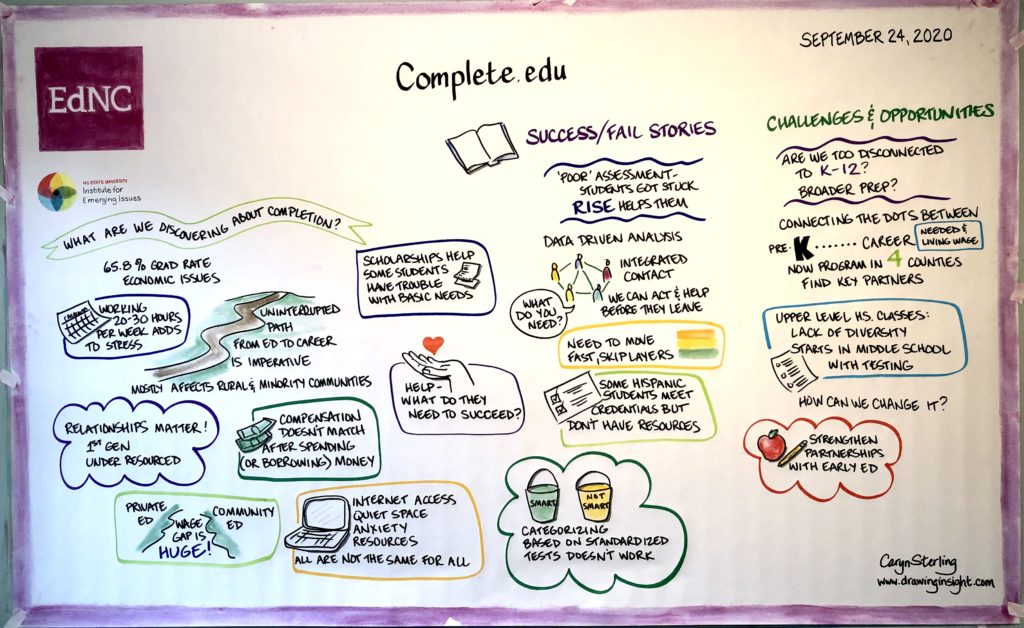
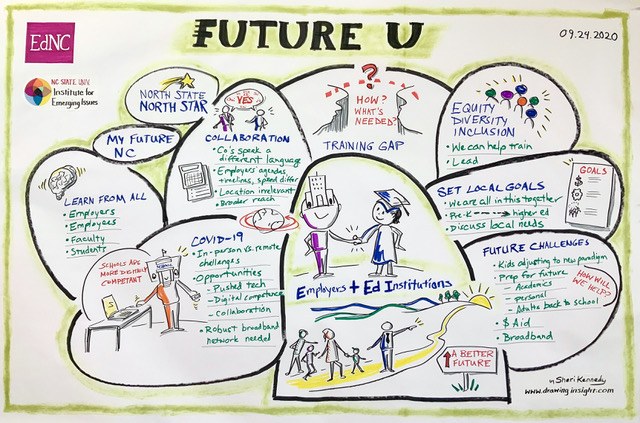
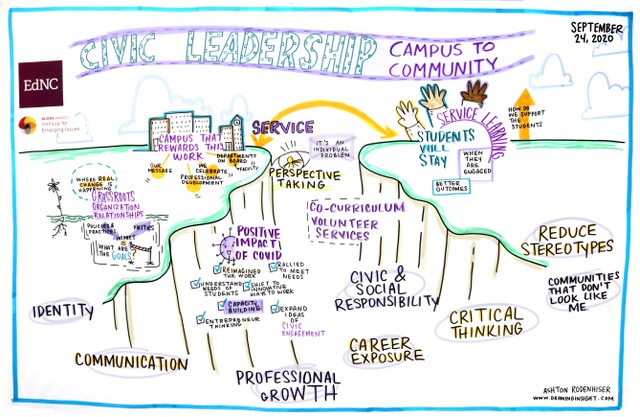
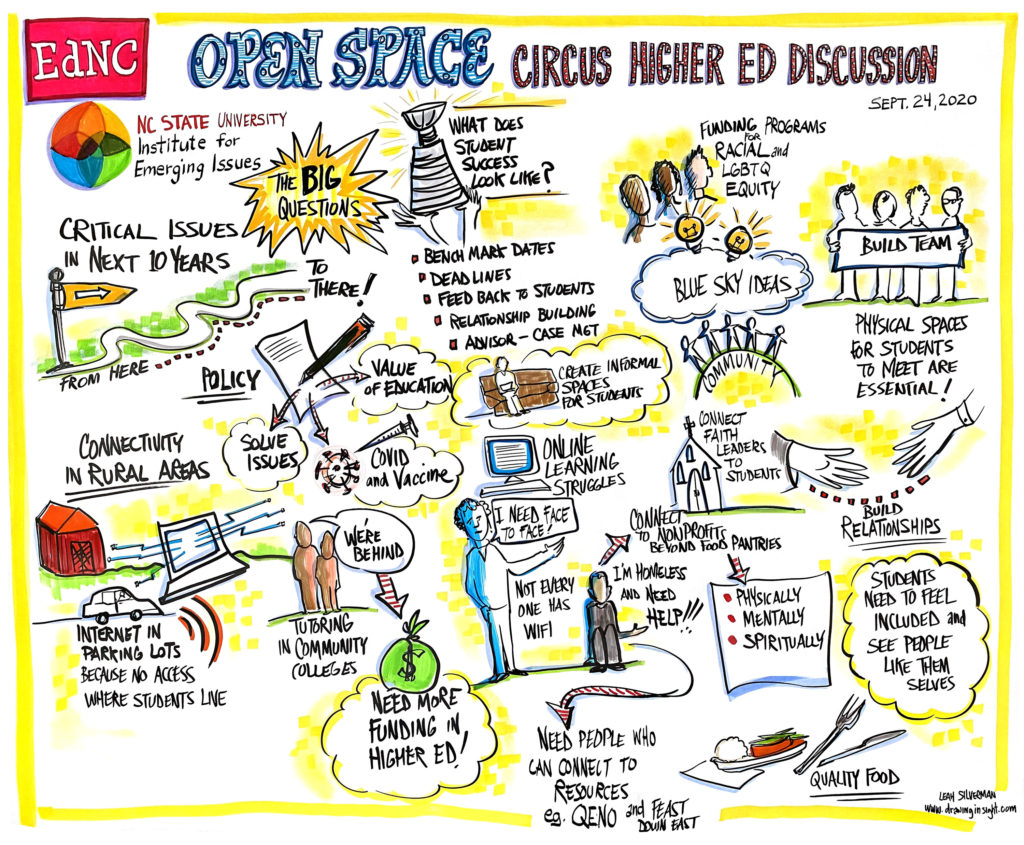
Student experiences
Following the discussion sessions, attendees heard from two students, Melanie Flowers and Jason Fyle, about their experiences in higher education. Flowers is a senior at North Carolina State University working towards her bachelor’s degree in communication. Fyle is a student at Asheville-Buncombe Technical Community College and is working towards his associate of science degree in HVAC.
Fyle, who had been in the service industry in Asheville, had been out of work for several months before he decided to enroll at A-B Tech. “I’ve always had grandparents telling me you should learn a trade, you should learn a trade, and I never really considered their advice until now,” Fyle said. He decided to enroll in the HVAC program because “I want to always know that I will have a job,” he said.
Flowers said this year has not been the senior year she thought it would be, but she feels like she is a better person because of that.
“This isn’t the year I thought I would have, but I wouldn’t at all change the circumstances,” she said. “I think I’m learning how to care for people in this pandemic and these times have just challenged me, made me a better person, and I think that’s an experience that all college students should seek.”
Flowers spoke of the importance of internships and extracurricular experiences in her development, and Fyle said more scholarships for adult students would help them go back to school.
Leading in transformation
The future of postsecondary education is always on the mind of institutional leaders, even while they grapple with the unprecedented challenges brought by COVID-19. NC State’s chancellor Randy Woodson led a panel discussion on how to lead an institution of higher education during a time of massive change.
“What can we do collectively as higher education leaders to make sure that we’re doing everything we can to bring students into our system … and what can we do to help them get across the finish line?” he said.
Woodson was joined by Kim A. Wilcox, chancellor of University of California Riverside, and William Serrata, president of El Paso County Community College District. Both schools have excelled in measures of social mobility for their student populations.
Both Serrata and Wilcox highlighted the importance of culture in transforming the way their institutions serve students. Serrata works with their K-12 partners to engage families as early as when their children are in kindergarten.
“Research indicates that children as young as second and third grade are deciding that they’re going to go to college, and we in higher ed usually wait until they’re in high school to recruit them,” he said.
Wilcox said to focus on culture and then hire people who buy into and support that culture. “Our campus, naturally, really interrogates people about their belief in the culture,” he said.
UC Riverside has increased their four-year graduation rate by 16 percentage points in the last five years and eliminated the graduation gap between students of different races and ethnicities, according to Wilcox and Woodson.
A vision for the future
The conference closed with a call to action to reimagine education. Kelly Young, the president of Education Reimagined, led the session.
Education Reimagined started eight years ago bringing together K-12 stakeholders to address two problems, Young said.
“We have not been able to change the trajectory of our children of color, low SES, rural students in the way that we want to. We have not served them well,” Young said. “And in addition to that, we have a system of education that was an invented centuries ago, in some cases in K-12 really at the last turn of the century, and it wasn’t designed to produce the kinds of outcomes that the world needs today for a complex, fast-changing world where we have incredibly complex problems that are global, not unique to a single country or region.”
Through those conversations, they developed five elements for a reimagined education system that will address these two issues. The elements are outlined in the graphic below.
IEI will hold the two additional virtual meetings as part of the ReCONNECT series:
- A Digitally Inclusive North Carolina on Oct. 15, 2020
- Mental Health & Well-Being on Oct. 29, 2020
You can find out more about those sessions here.


